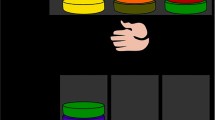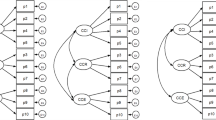Abstract
The purpose of this study is to determine whether modularized standalone sections within topics in computer science are deterministic in the performance of students studying subjects that involve computational thinking. Teaching methods regarding this form of cognition within the realm of computer science is presented with a limited understanding in how students think and analyze problems when presented material with ambiguous forms of approach. The method and scope of the work involve the presentation of topics in computer science in a modularized form that determines whether correctness is a function of time based on cognitive load introduced in computational thinking concepts, involving base conversions of transposition ciphers and programming fundamentals.
Access this chapter
Tax calculation will be finalised at checkout
Purchases are for personal use only
Similar content being viewed by others
References
Imberman, S., Sturm, D., Azhar, M.: Computational thinking: expanding the toolkit. J. Comput. Sci. Coll. 29(6), 39–46 (2016)
Lamprou, A., Repenning A.: Teaching how to teach computational thinking. In: Proceedings of the 23rd Annual ACM Conference on Innovation and Technology in Computer Science Education (2018)
De Jong, I.: Teaching computational thinking with interventions adapted to undergraduate students’ proficiency levels. In: Annual Conference on Innovation and Technology in Computer Science Education, ITiCSE, pp. 571–572. Association for Computing Machinery (2020)
De Jong, I., Jeuring, J.: Computational thinking interventions in higher education: a scoping literature review of interventions used to teach computational thinking. In: Koli Calling 2020: Proceedings of the 20th Koli Calling International Conference on Computing Education Research, pp. 1–10 (2020)
Wing, J.M.: Computational thinking. Commun. ACM 49(3), 33–35 (2006)
Resnick, L.B.: Education and Learning to Think. National Academy Press, Washington, DC (1987)
Wing, J.M.: Computational thinking—what and why? In: Article of the Magazine of the Carnegie Mellon University School of Computer Science (2011)
Shaffer, D., Doube, W., Tuovinen, J.: Applying cognitive load theory to computer science education. In: Petre, M., Budgen, D. (eds.) 15th Annual Workshop of the Psychology of Programming Interest Group, pp. 333–346 (2003)
Sweller, J., van Merrienboer, J.J.G., Paas, F.G.W.C.: Cognitive architecture and instructional design. Educ. Psychol. Rev. 10, 251–296 (1998)
Li, Y., et al.: Computational thinking is more about thinking than computing. J. STEM Educ. Res. 3, 1–18 (2020)
Cowan, N.: George Miller’s magical number of immediate memory in retrospect: Observations on the faltering progression of science. Psychol Rev. 122, 536 (2015)
Miller, G.A.: The magical number seven, plus or minus two: some limits on our capacity for processing information. Psychol. Rev. 63(2), 81–97 (1956)
Kong, S., Wang, Y.: Formation of computational identity through computational thinking perspectives development in programming learning: a mediation analysis among primary school students. Comput. Human Behav. 106, 106230 (2020)
Franklin, D., Salac, J., Crenshaw, Z., Turimella, S.: Exploring student behavior using the TIPP&SEE learning strategy. In: Proceedings of the 2020 ACM Conference on International Computing Education Research (2020)
Sweller, J.: Cognitive load theory. Psychol. Learn. Motiv. 55, 37–76 (2011)
Labusch, A., Eickelmann, B., Vennemann, M.: Computational thinking processes and their congruence with problem-solving and information processing. In: Kong, S.C., Abelson, H. (eds.) Computational Thinking Education, pp. 65–78. Springer, Singapore (2019). https://doi.org/10.1007/978-981-13-6528-7_5
Wing, J.M.: Computational thinking’s influence on research and education for all. Italian J. Educ. Technol. 25(2), 7–14 (2017)
Dejene, W.: The practice of modularized curriculum in higher education institution: active learning and continuous assessment in focus. Cogent Educ. 6(1), Art. 1611052 (2019)
Gerjets, P., Scheiter, K., Catrambone, R.: Designing instructional examples to reduce intrinsic cognitive load: molar versus modular presentation of solution procedures. Instr. Sci. 32, 33–58 (2004)
Walkington, C., Clinton, V., Ritter, S., Nathan, M.J.: How readability and topic incidence relate to performance on mathematics story problems in computer-based curricula. J. Educ. Psychol. 107(4), 1051–1074 (2015)
Acknowledgements
This material is based upon work supported by the National Science Foundation (NSF) under Grant No. 1662487. Any opinions, findings, and conclusions or recommendations expressed in this material are those of the authors and do not necessarily reflect the views of the NSF.
Author information
Authors and Affiliations
Corresponding author
Editor information
Editors and Affiliations
Rights and permissions
Copyright information
© 2022 The Author(s), under exclusive license to Springer Nature Switzerland AG
About this paper
Cite this paper
Gabatino, T., Ogawa, MB.C., Crosby, M.E. (2022). Abstracting the Understanding and Application of Cognitive Load in Computational Thinking and Modularized Learning. In: Schmorrow, D.D., Fidopiastis, C.M. (eds) Augmented Cognition. HCII 2022. Lecture Notes in Computer Science(), vol 13310. Springer, Cham. https://doi.org/10.1007/978-3-031-05457-0_22
Download citation
DOI: https://doi.org/10.1007/978-3-031-05457-0_22
Published:
Publisher Name: Springer, Cham
Print ISBN: 978-3-031-05456-3
Online ISBN: 978-3-031-05457-0
eBook Packages: Computer ScienceComputer Science (R0)




